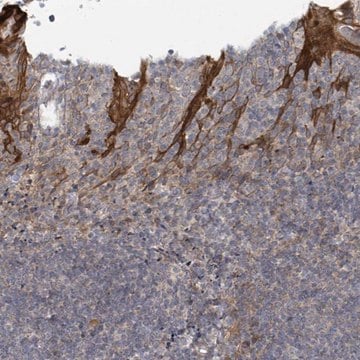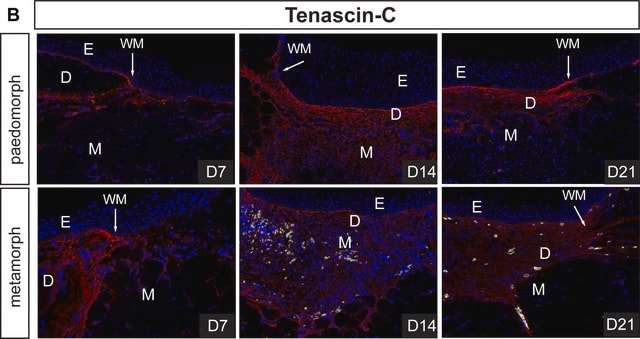推荐产品
生物源
mouse
品質等級
共軛
ALEXA FLUOR™ 488
抗體表格
purified antibody
抗體產品種類
primary antibodies
無性繁殖
TRA - 1-60, monoclonal
物種活性
human
技術
immunocytochemistry: suitable
同型
IgM
運輸包裝
wet ice
目標翻譯後修改
unmodified
基因資訊
human ... PODXL(5420)
一般說明
Human embryonal carcinoma (EC) cells are the stem cells of teratocarcinomas, and they are key components of germ cell tumors (GCTs). They express several high molecular weight glycoprotein antigens that are down-regulated upon differentiation. One of these antigens, defined by monoclonal antibody TRA-1-60, can be detected in the serum of GCT patients and provides a useful complement to the established serum markers human chorionic gonadotropin and α-fetoprotein, especially in those patients without elevated serum human chorionic gonadotropin or α-fetoprotein.
特異性
This antibody reacts with TRA-1-60 antigen expressed upon the surface of human EC, EG, and ES cells. No immunoreactivity is seen with murine EC, EG or ES cells. TRA-1-81 (MAB4381A4) and TRA-1-60 monoclonal antibodies recognize antigens that are associated with a pericellular matrix proteoglycan.
免疫原
Human embryonal carcinoma cell line 2102Ep
應用
Detect TRA-1-60 using this Anti-TRA-1-60 Antibody, clone TRA-1-60, Alexa Fluor 488 Conjugate validated for use in IC.
Research Category
Neuroscience
Neuroscience
品質
Evaluated by Immunocytochemistry in H9 human embryonic stem cells.
Immunocytochemistry Analysis: A 1:200 dilution of this antibody detected TRA-1-60 in H9 human embryonic stem cells.
Immunocytochemistry Analysis: A 1:200 dilution of this antibody detected TRA-1-60 in H9 human embryonic stem cells.
外觀
size exclusion
Purified mouse monoclonal IgM conjugated to Alexa Fluor™ 488 in PBS with 0.1% sodium azide and 15 mg/mL BSA.
儲存和穩定性
Stable for 1 year at 2-8°C from date of receipt.
分析報告
Control
H9 human embryonic stem cells
H9 human embryonic stem cells
法律資訊
ALEXA FLUOR is a trademark of Life Technologies
免責聲明
Unless otherwise stated in our catalog or other company documentation accompanying the product(s), our products are intended for research use only and are not to be used for any other purpose, which includes but is not limited to, unauthorized commercial uses, in vitro diagnostic uses, ex vivo or in vivo therapeutic uses or any type of consumption or application to humans or animals.
未找到合适的产品?
试试我们的产品选型工具.
儲存類別代碼
12 - Non Combustible Liquids
水污染物質分類(WGK)
WGK 2
閃點(°F)
Not applicable
閃點(°C)
Not applicable
Yohei Hayashi et al.
Communications biology, 1, 218-218 (2018-12-12)
Conventional cell handling and sorting methods require manual labor, which decreases both cell quality and quantity. To purify adherent cultured cells, cell purification technologies that are high throughput without dissociation and can be utilized in an on-demand manner are expected.
Kung-Kai Kuo et al.
Stem cells (Dayton, Ohio), 34(11), 2613-2624 (2016-06-25)
The network of stemness genes and oncogenes in human patient-specific reprogrammed cancer stem cells (CSCs) remains elusive, especially in liver cancer. HepG2-derived induced pluripotent stem cell-like cells (HepG2-iPS-like cells) were generated by introducing Yamanaka factors and the knockdown vector shTP53.
Ning Sun et al.
Proceedings of the National Academy of Sciences of the United States of America, 106(37), 15720-15725 (2009-10-07)
Ectopic expression of transcription factors can reprogram somatic cells to a pluripotent state. However, most of the studies used skin fibroblasts as the starting population for reprogramming, which usually take weeks for expansion from a single biopsy. We show here
Vanessa Sauer et al.
Cell transplantation, 25(12), 2221-2243 (2016-08-12)
Although several types of somatic cells have been reprogrammed into induced pluripotent stem cells (iPSCs) and then differentiated to hepatocyte-like cells (iHeps), the method for generating such cells from renal tubular epithelial cells shed in human urine and transplanting them
Zhongwen Li et al.
Cell death & disease, 10(10), 763-763 (2019-10-12)
Hepatocytes have been successfully generated from human pluripotent stem cells (hPSCs). However, the cost-effective and clinical-grade generation of hepatocytes from hPSCs still need to be improved. In this study, we reported the production of functional hepatocytes from clinical-grade human embryonic
我们的科学家团队拥有各种研究领域经验,包括生命科学、材料科学、化学合成、色谱、分析及许多其他领域.
联系技术服务部门







